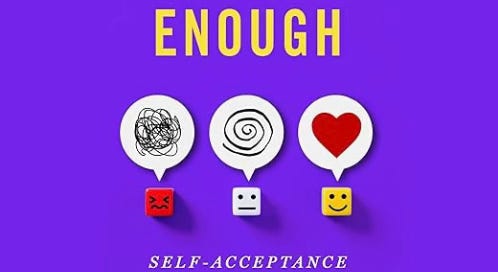Moving away from perfectionism doesn’t mean lowering your standards.
Keep your high standards! And…consider adding on one of these three things.
Last week, I recorded the audiobook of How to Be Enough, which will make its way into the world January 7. Check out the purple audiobook cover—I’m loving the emoji dice:
Everyone in the studio was lovely, dedicated, and helpful. But there was one person who liked to tease me: “Oh, you want to go back and fix mistakes—okay, I hear you, perfectionist!” Or, “Ha! It’s so funny that you say not to be a perfectionist and then you want to re-record that sentence.”
Of course I want to fix mistakes and make sentences sound good. Of course I have high standards for the recording. It’s for you, dear readers and listeners!
Here’s my shout-it-from-the-rooftops message: Moving away from perfectionism doesn’t mean lowering your standards.
Too often, we’re told “you need to stop when things are good enough.” And while I understand the sentiment behind that advice, I also disagree with it when it comes to what’s important to us. When something is important and meaningful to us, stopping when things are “good enough” feels like settling for subpar or mediocre outcomes.
At the same time, though, we don’t want to push too hard. We don’t want to get caught up in overevaluation, which is conflating our self-worth with our performance (see this post for deep dive on that), or the harsh condemnation of self-criticism.
What to do? Rather than lowering our standards, let’s go in the opposite direction. Let’s add on a few things.
#1: Instead of lowering your standards, add on questioning.
Often, when we’re used to aiming high, we do so by default. We aim for the generic Right Thing. Everything “should” be to the best of our abilities.
Or should it?
Rather than using your precious energy to hit it out of the park by default, add on some questions. Ask yourself:
“Is this what I want to be spending my time and energy on?”
“Is this helping me be the person I want to be?”
“Is this part of the life I want to live?”
There is no wrong answer. You may decide to hit it out of the park on learning the banjo, writing fan fiction, building community, traveling the world, or cleaning out your sock drawer. The whole point is to question the generic Right Thing. You get to choose where you aim high.
For me, my values mean I have high standards for my work, my social behavior, and a well-planned road trip. But my values also mean I don’t aim particularly high with my wardrobe (sweaters and sneakers all day every day—my kids say I dress like a suburban dad) or keeping the clutter in my house under control (file-by-pile, anyone?)
In sum? Aim high in the things you care about. And question whether you need to aim high with the things that matter less to you.
#2: Instead of lowering your standards, add on flexibility.
Instead of lowering your standards, ask yourself, what would work given this context?
Let’s say you hold the high standard of “eating healthy.” Given the context of a day off with lots of time to cook, you might make what we conventionally think of as a healthy dinner.
But given the context of a 30-minute airport layover, your healthy dinner might consist of a bag of pistachios and some turkey jerky from Hudson News (which probably beats a bag of M&Ms and a Dr. Pepper, but no judgment if that’s dinner—I’ve been there.)
In short, rather than rigidly adhering to one unyielding standard (and then failing to meet it), we flexibly adapt based on the context.
#3: Instead of lowering your standards, add on compassion.
Rather than trying to push or shame ourselves into doing better, we can be kind to ourselves.
“Being kind to ourselves” might mean the classic advice of “talk to yourself like a good friend,” but if that makes you feel like you have to dispense a steady stream of self-compassionate hype to yourself, try this instead:
Make your actions compassionate. What would you do to be kind to yourself? What do you need right now to relieve some of your stress or pain?
It might mean going to bed early so you can catch up on much-needed sleep. But it might also mean letting yourself stay up late to comfort-watch Love, Actually or Back to the Future. Note that these are really different: going to bed earlier is disciplined and an investment. Staying up late to watch a movie you’ve seen fourteen times is fun and a respite. It all depends on what you need right now.
Likewise, making yourself go to the gym because you know from experience you’ll feel better afterwards could be self-compassion. But self-compassion could also be permission to skip the gym if you’re already exhausted and overscheduled. Compassion can be permission not to do everything we expect of ourselves.
Which way is “correct”? Again, it depends on what you need. (Hey, that sounds like adding on flexibility!)
If you found this post useful, there’s a lot more in How to Be Enough: Self-Acceptance for Self-Critics and Perfectionists, coming January 7, 2025. And hey, there’s a preorder button right there!
Pre-orders are THE single best way to support me and this work—they send a message to publishers and bookstores and help influence print runs and publicity efforts. Whether you’ve been here since Savvy Psychologist days or you just discovered this newsletter yesterday, thank you for considering a pre-order!
Be kind to others and yourself,










Great tips. I've been doing those intuitively and it really made me feel less stressed. Yeah !